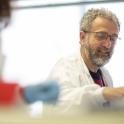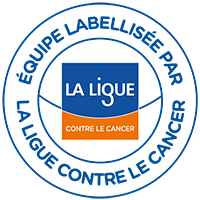Published on 11.12.2025
Presentation
Our laboratory investigates the causes and consequences of genomic instability associated with (1) Mendelian diseases affecting the hematopoietic system (inherited bone marrow failure syndromes, IBMF), and (2) chromosomal translocations linked to cancers.
Over time, somatic mutations and chromosomal alterations that accumulate in the cells of healthy individuals contribute to the development of aging-related diseases and cancers. Moreover, cancers primarily arise from an initiating genetic event followed by secondary genetic alterations that drive cellular transformation. Finally, mutations within established tumor cells undermine the promise of therapies based on the concept of synthetic lethality.
The main objectives of our laboratory are:
1. Identify initiating (germline) and secondary (somatic) genetic alterations in IBMF and analyze their functional and clinical impact. Most IBMFs combine impaired production of one or more blood lineages with a predisposition to myelodysplasia and leukemia. Some IBMFs are caused by defects in DNA repair, telomere dysfunction (telomeropathies), or chronic cellular stress (e.g., ribosomopathies). Characterizing both the germline mutations responsible for IBMFs and the secondary somatic mutations—whether deleterious (pro-oncogenic) or protective (compensatory)—is crucial for understanding tumorigenesis in these disorders. Ongoing patient recruitment and genetic analysis will identify new genes and/or variants responsible for IBMFs. Longitudinal follow-up will reveal clones harboring pro-oncogenic (e.g., TP53) or protective (Somatic Genetic Rescue, SGR) somatic genetic alterations and determine their role in clinical progression. Recently, we identified a novel genetic cause of IBMF and new variants in two telomere protective factors whose functions remain poorly understood. Structure/function analyses will clarify the role of these factors.
2. Understand oncogenesis associated with the formation of chromosomal translocations. Our original translocation models allow us to track the steps of cellular transformation from primary cell to tumor. These studies include various cancer types, such as Ewing sarcoma and ALK+ ALCL, to:
- Map genomic activity during oncogenesis by combining structural and expression analyses (replication timing, transcriptional and epigenetic profiles) to identify new regulators of tumorigenesis. We hypothesize that the formation of a specific translocation induces broader changes in nuclear organization beyond the simple expression of the fusion oncogene.
- Clarify the role in oncogenesis of potential secondary events required for cellular transformation (e.g., mutations in STAG2, TP53, CDKN2A, and chain rearrangements (chromoplexy) detected in Ewing sarcoma).
- Identify and characterize new biomarkers/therapeutic targets. We are initiating a CAR-T cell targeting strategy against a candidate gene for ALK+ ALCL.
Main publications and patents:
Principales publications
De Tocqueville S, Donaires F, DeCleene N, Ba I, Nouri M, Kermasson L, Chelbi M, Bergot E, LeblancT, Borie R, Philippot Q, Antone E, Prévot G, Blanchard E, Keren, Lainey E, Catto M, Santana B, Callebaut C, Young N.S, Halfon-Domenech C, Calado R.T, Bertuch A, Rodrigues-Gutierrez F, Kannengiesser C, Revy P. Somatic genetic rescue in ZCCHC8-associated telomere biology disorders. Blood. 2025.In press.
Cuinat S, Chatron N, Petit F, Brunelle P, Dincuff E, Aubert Mucca M, Bieth E, Schmetz A, Rieder H, Wollnik B, Kaulfuß S, Yigit G, McKeown C, Savage T, Mulligan MR, Bicknell LS, Corsten-Janssen N, Edery P, Lesca G, de Villartay JP, Putoux A. XRCC4-related microcephalic primordial dwarfism: description of a clinical series of 7 cases, phenotype expansion and new diagnostic approaches. Eur J Hum Genet. 2025 Jul;33(7):842-851. doi: 10.1038/s41431-025-01821-0. Epub
Garrigue A, Kermasson L, Susini S, Fert I, Mahony C, Sadek H, Luce S, Chouteau M, Cavazzana M, Six E, Le Bousse Kerdilès MC, Anginot A, Souraud, Cormier-Daire V, Willems M, Sirvent A, Callebaut C, Bertrand JY, André I, Lagresle-Peyrou C, Revy P. Human Oncostatin M deficiency underlies an inherited severe bone marrow failure syndrome. The journal of clinical investigation. J Clin Invest. 2025;135(6):e180981
Adelon J, Abolhassani H, Esenboga S, Fouyssac F, Cagdas D, Tezcan I, Kuskonmaz B, Cetinkaya D, Suarez F, Mahdaviani SA, Plassart S, Mathieu AL, Fabien N, Malcus C, Morfin-Sherpa F, Billaud G, Tusseau M, Benezech S, Walzer T, De Villartay JP, Bertrand Y, Belot A. Human DNA-dependent protein kinase catalytic subunit deficiency: A comprehensive review and update. J Allergy Clin Immunol. 2024 Nov;154(5):1300-1312. doi: 10.1016/j.jaci.2024.06.018.
Kochman R, Ba I, Yates M, Pirabakaran V, Gourmelon F, Churikov D, Lafaille M, Kermasson L, Hamelin C, Marois I, Jourquin F, Bechara M, Lainey E, Nunes H, Breton P, Penhouet M, Géli V, Lachaud C, Maréchal A, Revy P*, Kannengiesser C*, Saintomé C*, Coulon S*. Heterozygous RPA2 variant as a novel genetic cause of telomere biology disorders. Genes & Development.2024 doi: 10.1101/gad.352032.124. * co-last authors
De Tocqueville S, Martin E, Riller Q, Kermasson L, France B, Magérus A, Delhommeau F, Hirsch P, Echalier A, Fischer A, Moshous D, Revy P. Long-Term Assessment of Hematological Recovery Following Somatic Genetic Rescue in a MYSM1-Deficient Patient: Implications for in vivo Gene Therapy. British Journal of Haematology. 2024. doi: 10.1111/bjh.19744
Cario H, Bertrand A, Tan S, Auber B, Erlacher M, Mair E-M, Von Hardenberg S, Lebrecht D, Revy P, Warren AJ. Shwachman-Diamond syndrome due to biallelic EFL1 variants with complex and fatal clinical course in early infancy. British Journal of Haematology. 2024 In press
Benavides‐Nieto M, Adam F, Martin E, Lagresle‐Peyrou C, Callebaut I, Kauskot A, Repérant C, Feng M, Bordet JC, Castelle M, Morelle G, Boussard C, Brouzes C, Zarhrarte M, Lambert N, Picard C, Bodet D, Rouger‐Gaudichon J, Revy P, de Villartay JP, Moshous D. RAP1B gain‐of‐function mutations cause thrombopathy 1 and immunodeficiency due to altered platelet activation and lymphocyte trafficking. Journal of Clinical Investigation. 2024. 134(17):e169994
Bertrand A, Ba I, Kermasson L, Chable N, Pirabakaran V, Lainey E, Kallel F, Picard C, Hadiji S, Coolen-Allou, de Villartay JP, Moshous D, Roelens M, Callebaut I, Kannengiesser C, Revy, P. Characterization of novel mutations in the TEL-patch domain of the telomeric factor TPP1 associated with telomere biology disorders. Hum. Mol. Genet. 2024 33(7):612-623
Bories C, Lejour T, Adolphe F, Kermasson L, Couvé S, Tanguy L, Luszczewska G, Watzky M, Garnier P, Groisman R, Ferlicot S, Richard S, Saparbaev M, Revy P, Gad S, Renaud F. DCLRE1B/Apollo mutations associated with renal cell carcinoma impair telomere protection. BBA - Molecular Basis of Disease. 2024 1870(4):167107
Revy P*, Kannengiesser C, Bertuch AA. Genetics of human telomere biology disorders. Nature Reviews Genetics. 2023. 24:8-108 * Corresponding author.
Schertzer, M.; Jullien, L.; Pinto, A.L.; Calado, R.T.; Revy, P.; Londoño-Vallejo, A. Human RTEL1 Interacts with KPNB1 (Importin β) and NUP153 and Connects Nuclear Import to Nuclear Envelope Stability in S-Phase. Cells. 2023, 12, 2798.
Galtier J, Dimicoli-Salazar S, Trimouille A, Lainey E, Revy P, Bidet A, Vial Y, Forcade E, Negrier-Leibreich ML, Rivière E, Tinat J, Le Meur N, Ménard C, Pigneux A, Leguay T, Dumas PY, Ba I, Kannengiesser C. First clinical description of a pedigree with complete NAF1 deletion. Leuk Lymphoma. 2023 23:1-4
Allain V, Grandin V, Meignin V, Bertinchamp R, Boutboul D, Fieschi C, Galicier L, Gérard L, Malphettes M, Bustamante J, Fusaro M, Lambert N, Rosain J, Lenoir C, Kracker S, Rieux-Laucat F, Latour S, de Villartay JP, Picard C, Oksenhendler E. Lymphoma as an Exclusion Criteria for CVID Diagnosis Revisited. J Clin Immunol. 2023 Jan;43(1):181-191. doi: 10.1007/s10875-022-01368-5.
Fournier B, Mahlaoui N, Moshous D, de Villartay JP. Inborn errors of immunity caused by defects in the DNA damage response pathways: Importance of minimizing treatment-related genotoxicity. Pediatr Allergy Immunol. 2022 Jun;33(6):e13820. doi: 10.1111/pai.13820.
Chappert P, Huetz F, Espinasse MA, Chatonnet F, Pannetier L, Da Silva L, Goetz C, Megret J, Sokal A, Crickx E, Nemazanyy I, Jung V, Guerrera Chiara, Storck S, Mahévas M, Cosma A, Revy P, Fest T, Reynaud CA, and Weill JC. Dynamic Interactions Within the Splenic Niche and Long-Lasting Germinal Center Imprinting Define Human Anti-Vaccinia Long-Lived Memory B Cells. Immunity. 2022. 55:1872-1890
Donné R, Saroul-Aïnama M, Cordier P, Hammoutene A, Stadler M, Herrag M, Chansel-Da Cruz M, Nemazanyy I, Caruso S, Bonnafous S, Tran A, Gual P, Paradis V, Heikenwalder M, Revy P, Desdouets C. Replication stress triggered by nucleotide pool imbalance drives DNA damage and activation of cGAS-STING pathway in non-alcoholic fatty liver disease. Dev Cell. 2022 57(10), 1872-1890.
Kermasson L, Churikov D, Awad A, Smoom R, Lainey E, Touzot F, Audebert-Bellanger S, Haro S, Roger L, Costa E, Mouf M, Bottero A, Oleastro M, Abdo C, de Villartay JP, Géli V, Tzfati Y, Callebaut I, Danielian S, Soares G, Kannengiesser C, Revy P. Inherited human Apollo deficiency causes severe bone marrow failure and developmental defects. Blood. 2022 139(16):2427-2440
Manali E, Kannengiesser C, Borie R, Ba I, Bouros D, Markopoulou A, Antoniou K, Kolilekas L, Papaioannou A, Tzilas V, Tzouvelekis A, Daniil Z, Fouka E, Papakosta D, Xyfteri A, Karakatsani A, Loukides S, Korbila I, Tomos I, Konstantinides A, Gogali A, Steiropoulos P, Papanikolaou I, Bazaka C, Haritou A, Vassilakopoulos T, Maniati M, Kagouridis K, Markozannes E, Bouros E, Rampiadou C, Kounti G, Trachalaki A, Dimeas I, Karampitsakos T, Lyberopoulos P, Malamadakis N, Spyropoulou S, Revy P, Lainey E, Dieudé P, Rebah K, Ménard C, Oudin C, Masson C, Plessier A, Legendre M, Nathan N, Coulomb-L’Hermine A, Clement A, Amselem S, Boileau C, Crestani B, Papiris S. GENotype-PHENotype RElationships in inheritable IPF The GREEK national cohort Study. Respiration. 2022;101(6):531-543
Sharma R, Sahoo SS, Honda M, Granger SL, Goodings C, Sanchez L, Künstner A, Busch H, Beier F, Pruett-Miller SM, Valentine M, Fernandez AG, Chang TC, Géli V, Churikov D, Hirschi S, Pastor VB, Boerries M, Lauten M, Kelaidi C, Wlodarski MW, Cooper MA, Nicholas SK, Rosenfeld JA, Polychronopoulou S, Kannengiesser C, Saintome C, Niemeyer CM, Revy P, Wold MS, Spies M, Erlacher M, Coulon S, Wlodarski MW. Gain-of-Function Mutations in RPA1 Cause a Syndrome with Short Telomeres and Somatic Genetic Rescue. Blood. 2022 doi: 10.1182/
Roch B, Abramowski V, Etienne O, Musilli S, David P, Charbonnier JB, Callebaut I, Boussin FD, de Villartay JP. An XRCC4 mutant mouse, a model for human X4 syndrome, reveals interplays with Xlf, PAXX, and ATM in lymphoid development. Elife. 2021 Sep 14;10:e69353. doi: 10.7554/eLife.69353.
Tan S*, Kermasson L*, Hilcenko C, Kargas V, Traynor D, Boukerrou A, Escudero-Urquijo N, Faille A, Rossmann M, Bertrand A, Goyenechea B, Moreil J, Alibeu O, Beaupain B, Bôle-Feysot C, Fumagalli S, Kaltenbach S, Martignoles J-A, Masson C, Nitschké P, Parisot M, Pouliet A, Radford-Weiss I, Tores F, de Villartay J-P, Zarhrate M, Bond P.J, Bellanné-Chantelot C, Callebaut I, Delhommeau F, Donadieu J, Warren A.J#, Revy P#. Somatic genetic rescue of a germline ribosome assembly defect. Nat. Comm. 2021. 9; 12(1):5044
Revy P and Donadieu J. EFL1 deficiency: A little is better than nothing (Blood Commentary). Blood. 2021. 138(21):2016-2018
Sole A, Grossetête-Lalami S, Heintzé M, Babin L, Zaidi S, Revy P, Renouf B, De Cian A, Giovannangeli C, Pierre-Eugène C, Tomishima M, Jasin M, Grünewald T, Delattre O, Surdez D, Brunet E. Unraveling Ewing sarcoma tumorigenesis originating from patient-derived Mesenchymal Stem Cells. Cancer Research. 2021. canres.3837.
Mokrani S, Granotier-Beckers C, Etienne O, Kortulewski T, Grisolia C, de Villartay JP, Boussin FD. Higher chromosome stability in embryonic neural stem and progenitor cells than in fibroblasts in response to acute or chronic genotoxic stress. DNA Repair (Amst). 2020 Apr;88:102801. doi: 10.1016/j.dnarep.2020.102801.
Musilli S, Abramowski V, Roch B, de Villartay JP. An <i>in vivo</i> study of the impact of deficiency in the DNA repair proteins PAXX and XLF on development and maturation of the hemolymphoid system. J Biol Chem. 2020 Feb 21;295(8):2398-2406. doi: 10.1074/jbc.AC119.010924.
Bétermier M, Borde V, de Villartay JP. Coupling DNA Damage and Repair: an Essential Safeguard during Programmed DNA Double-Strand Breaks? Trends Cell Biol. 2020 Feb;30(2):87-96. doi: 10.1016/j.tcb.2019.11.005.
Chansel-Da Cruz M, Hohl M, Ceppi I, Kermasson L, Magiorella L, Modesti M, de Villartay J-P, Ileri T, Cejka P, Petrini JHJ, Revy P. A disease-causing single amino-acid deletion in the coiled-coil domain of RAD50 impairs MRE11 complex functions in yeast and humans. Cell Reports. 2020. 33(13):108559. doi: 10.1016
Awad A, Glousker G, Lamm N, Tawil S, Smoom R, Revy P, and Tzfati Y. Full length RTEL1 is required for the elongation of the single-stranded telomeric overhang by telomerase. Nucleic acid research. 2020. 48(13):7239-7251.
Benyelles M, O'Donohue MF, Kermasson L, Lainey E, Borie R, Lagresle-Peyrou C, Nunes H, Cazelles C, Fourrage C, Ollivier E, Marçais A, Gamez AS, Morice-Picard F, Caillaud D, Pottier N, Menard C, Ba I, Fernandes A, Crestan B, de Villartay JP, Gleizes PE, Callebaut I, Kannengiesser C, Revy P. Human NHP2 deficiency impairs rRNA biogenesis and causes pulmonary fibrosis and Høyeraal-Hreidarsson syndrome. Hum. Mol. Genet. 2020. 29(6):907-922 (Cover of the issue)
Takedachi, A.,Despras E, Hasanova Z, Scaglione S, Guérois R, Audebert S, Camoin L, Schertzer M, Guille A, Churikov D, Guervilly J-H Callebaut I, Naim V, Chaffanet M, Borg J-P, Bertucci F, Revy P, Birnbaum D, Londoño-Vallejo A, Kannouche P, Gaillard P-H. SLX4 interacts with RTEL1 to prevent transcription- mediated DNA replication perturbations. Nature Struct. Mol. Biol. 2020. 27(5):438-449.
Kannengiesser, C., Effrosyni D. M., Revy, P., Callebaut, I., Ba, I., Borgel, A., Oudin, C., Harito, A, Olilekas, L., Malagari, K., Borie, R., Lainey, E., Boileau, C., Crestani, B., Papiris, S.A. First heterozygous NOP10 mutation in Familial Pulmonary Fibrosis. Eur. Resp. J. 2020. pii: 1902465.
Brevet.
2021: BRUNET21072MC/BTL( BRUNET- Main Inventor) -“Methods for the treatment of anaplastic large cell lymphoma” INSERM/ Fondation IMAGINE–(EP21305467.9; PCT/EP2022/059497)
Team
Resources & publications
-
 2019Journal (source)Oncotarget
2019Journal (source)OncotargetReduced recruitment of 53BP1 during interstrand crosslink repair is associate...
-
 Journal (source)J. Allergy Clin. Immunol.
Journal (source)J. Allergy Clin. Immunol.PROMIDISα: A T-cell receptor α signature associated with immunodeficiencies c...
-
 2019Journal (source)Blood
2019Journal (source)BloodEFL1 mutations impair eIF6 release to cause Shwachman-Diamond syndrome.
-
 2019Journal (source)Nat. Rev. Genet.
2019Journal (source)Nat. Rev. Genet.Somatic genetic rescue in Mendelian haematopoietic diseases.
-
 2019Journal (source)Nat Commun
2019Journal (source)Nat CommunDefects in t6A tRNA modification due to GON7 and YRDC mutations lead to Gallo...
-
 2019Journal (source)Cell Death Differ.
2019Journal (source)Cell Death Differ.PAXX and Xlf interplay revealed by impaired CNS development and immunodeficie...
-
 2017Journal (source)Mol. Cell
2017Journal (source)Mol. CellSingle-Molecule Analysis of mtDNA Replication Uncovers the Basis of the Commo...












